The life and hard times of the criminal underclass has been a staple of the movies nearly as long as pictures have flickered across screens. Not only because violence is inherently captivating (nothing commands our attention faster than a brandished gun), but also because stories about the down and out almost invariably carry a patina of sociological import. In 1915, the great Hollywood auteur Raoul Walsh took to the Bowery to shoot Regeneration, the story of an orphan who grows up to be a gang boss, only to be saved by a good woman. Now the South African director Gavin Hood has told more or less the same story in his film Tsotsi.
Hood, who both wrote and directed Tsotsi, shot his story of regeneration in a Johannesburg shantytown crammed with life and corrugated-metal shacks. Based on the novel of the same title by Athol Fugard, written in 1961 though not published until 1980, the film pivots on a vicious 19-year-old thug named Tsotsi who leads a small gang of thieves. The word tsotsi — which means hoodlum and may derive from zoot suit — refers to rootless South African young male criminals who, having no tribal connections, take many of their cues from American gangster movies. Certainly, the character Tsotsi, played by the charismatic newcomer Presley Chweneyagae, seems to have consumed his share of big-screen shoot-’em-ups. He’s as compact as Al Pacino’s Tony Montana and just as lethal.
Shot in Super 35mm, a format that allows Hood to exploit the emotional and psychological uses of color photography, the film opens with a game of craps. Very quickly we learn that life here is little more than a game of chance in which losers greatly outnumber winners. Tsotsi would likely count himself among the latter. Along with his lackeys — the broken-down Boston (Mothusi Magano), the pitiless killer Butcher (Zenzo Ngqobe) and the foolish Aap (Kenneth Nkosi) — he preys on the unsuspecting with a heart of stone and a sharp metal spike. In one brutal scene, Butcher slips that spike into a middle-aged man who, having impertinently flashed a wad of cash, is left on the floor of a subway car like a scrap of garbage.
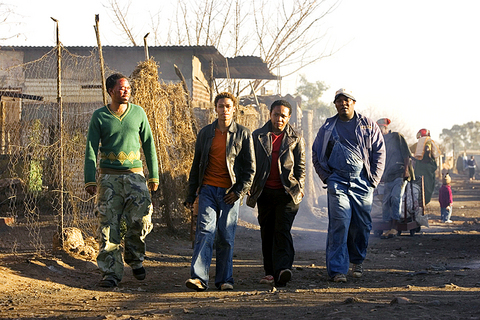
PHOTOS COURTESY OF GROUP POWER
The crime that leads Tsotsi down a different path, giving him a shot at redemption and the story its hook, occurs one evening in a comfortable suburb. After savagely beating Boston to a pulpy mess one drunken night, Tsotsi takes to the streets where he soon steals a running car. The owner, a woman who had just stepped into the rain to ring a doorbell, clings to the car even as Tsotsi steps on the gas, and her desperation soon becomes understandable: there’s an infant boy (a cherub with twinkling eyes and mighty lungs) gurgling in the backseat. Although Tsotsi ditches the car, our heartless thug stashes the baby in a shopping bag and carries him back to his shack as if he were a gift, which, of course, the child is.
You don’t have to read crystal balls to see into Tsotsi’s future; you just need to have watched a couple of Hollywood chestnuts in which hope trumps despair, and individual good will triumphs over all. That may help explain why the movie was nominated for an Academy Award for foreign-language film: despite the flavorful patois and subtitles, Tsotsi isn’t much different from every studio cautionary tale with an unhappy past, a criminal present and an unhappier future. Although no James Cagney, Chweneyagae delivers a fine, sympathetic performance, and you root for the actor even when his character inspires unforgiving thoughts. To his credit, Hood’s meditation on truth and reconciliation doesn’t traffic in the cheap thrills of art-house exploitation, like City of God; he wrings tears with sincerity, not cynicism.
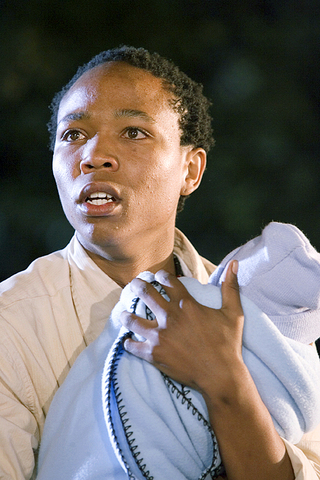
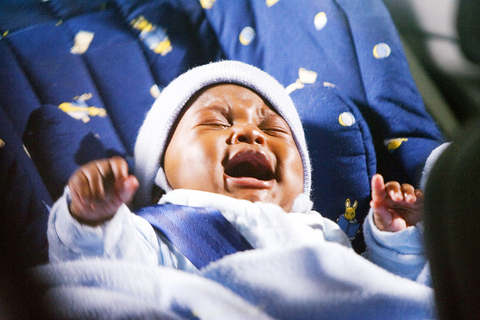
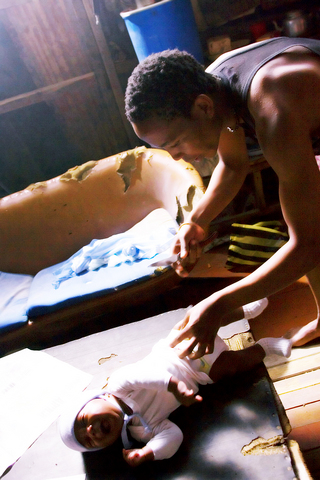
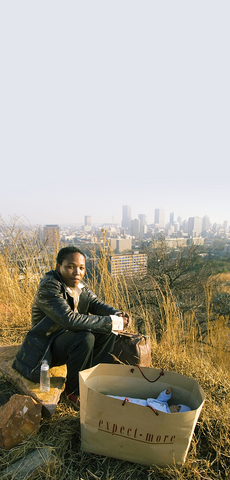

The canonical shot of an East Asian city is a night skyline studded with towering apartment and office buildings, bright with neon and plastic signage, a landscape of energy and modernity. Another classic image is the same city seen from above, in which identical apartment towers march across the city, spilling out over nearby geography, like stylized soldiers colonizing new territory in a board game. Densely populated dynamic conurbations of money, technological innovation and convenience, it is hard to see the cities of East Asia as what they truly are: necropolises. Why is this? The East Asian development model, with

June 16 to June 22 The following flyer appeared on the streets of Hsinchu on June 12, 1895: “Taipei has already fallen to the Japanese barbarians, who have brought great misery to our land and people. We heard that the Japanese occupiers will tax our gardens, our houses, our bodies, and even our chickens, dogs, cows and pigs. They wear their hair wild, carve their teeth, tattoo their foreheads, wear strange clothes and speak a strange language. How can we be ruled by such people?” Posted by civilian militia leader Wu Tang-hsing (吳湯興), it was a call to arms to retake

This is a deeply unsettling period in Taiwan. Uncertainties are everywhere while everyone waits for a small army of other shoes to drop on nearly every front. During challenging times, interesting political changes can happen, yet all three major political parties are beset with scandals, strife and self-inflicted wounds. As the ruling party, the Democratic Progressive Party (DPP) is held accountable for not only the challenges to the party, but also the nation. Taiwan is geopolitically and economically under threat. Domestically, the administration is under siege by the opposition-controlled legislature and growing discontent with what opponents characterize as arrogant, autocratic

When Lisa, 20, laces into her ultra-high heels for her shift at a strip club in Ukraine’s Kharkiv, she knows that aside from dancing, she will have to comfort traumatized soldiers. Since Russia’s 2022 invasion, exhausted troops are the main clientele of the Flash Dancers club in the center of the northeastern city, just 20 kilometers from Russian forces. For some customers, it provides an “escape” from the war, said Valerya Zavatska — a 25-year-old law graduate who runs the club with her mother, an ex-dancer. But many are not there just for the show. They “want to talk about what hurts,” she